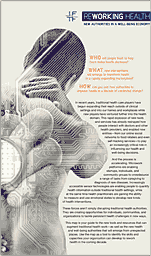Future Now
The IFTF Blog
Reworking Health: Amplifying the Positive
What’s wrong with you?
That’s one of the most basic questions that shape clinical encounters, even if it’s rarely asked so bluntly. Zeroing in on biomedical illness and curing it is one of the foundations of medicine as we know it. But as you may have read in our forecast, Optimizing the Care Effect, the biomedical condition and the biomedical treatment are far from the only things going on in an encounter between a patient and a care provider. As the shift towards person-centered or patient-centered care gains currency, fuzzier factors like identity and emotion will be critical in doctors’ offices and emergency rooms alike.
For instance, comparing doctors unfavorably to Starbucks Baristas, Peter Ubel points to researchers who went through audio recordings of interactions between cancer patients and senior oncologists, to evaluate doctors’ responses to patients negative emotions, and they found doctors responded appropriately less than 20 percent of the time—instead deflecting towards technical responses. Not acknowledging and soothing negative emotions is one thing, but over the past decade the evidence of direct health effects from positive emotions have been mounting.
Wellington Noguera, founder of Brazillian non-profit Doctors of Joy, quipped in his presentation at our spring retreat last year that the clown is sometimes the only person in a hospital asking, not what’s wrong, but what’s going right. “Where there’s joy, any joy at all, there’s hope.”
 In-vitro fertilization treatment is the topic of a fascinating study of this connection between joy, hope, and outcomes—and the role of new authorities like medical clowns in creating that connection. Conducted in Israel in 2010, the study followed 219 women in a quasi-randomized trial, half of whom received visits from a medical clown 15 minutes after their procedure. And those who got a laugh in were almost twice as likely to become pregnant compared with those who didn’t receive a visit from the clown. IVF is an emotionally fraught experience. It’s very expensive, it’s not very likely to work and, yet, people pin all their hopes for the future on it. The medical clown understands this narrative, she or he knows how scary it is, and they respond to that with a narrative that amplifies the positive, by telling jokes and doing magic tricks and increasing the patient’s sense of well-being, and their chances of a successful procedure.
In-vitro fertilization treatment is the topic of a fascinating study of this connection between joy, hope, and outcomes—and the role of new authorities like medical clowns in creating that connection. Conducted in Israel in 2010, the study followed 219 women in a quasi-randomized trial, half of whom received visits from a medical clown 15 minutes after their procedure. And those who got a laugh in were almost twice as likely to become pregnant compared with those who didn’t receive a visit from the clown. IVF is an emotionally fraught experience. It’s very expensive, it’s not very likely to work and, yet, people pin all their hopes for the future on it. The medical clown understands this narrative, she or he knows how scary it is, and they respond to that with a narrative that amplifies the positive, by telling jokes and doing magic tricks and increasing the patient’s sense of well-being, and their chances of a successful procedure.
And patients aren’t the only people who need to amplify the positive. In 2012, the Journal of the American Medical Association published the first comprehensive study of physician burnout—and found that 46 percent of physicians reported experiencing at least one symptom. And other studies show that as much as a third of all nurses working in high-risk settings are experiencing burnout at a given time. This creates a worse experience for patients and can lead to medical errors too. But research collected by Doctors of Joy in Brazil, and by the Center for Compassion and Altruism Research and Education (CCARE) at Stanford is showing that compassion and joy can combat burnout as well.
As a 2014 IFTF Future for Good Fellow, Wellington posits that to face the challenges of the future, the skills of a clown are just what the doctor ordered. From the radical acceptance of improvisation to the sheer healing effect of silliness, amplifying the positive may be key not only to health, but to work and life as well. Stay tuned for more on his fellowship projects as we continue to forecast Amplifying the Positive.
In our 2013 Health Horizons research, Reworking Health, we examined four emerging sources of authority—computation, narratives, networks, and ambience—that will fundamentally transform who we trust and what interventions will be available in a rapidly expanding health and well-being marketplace.
This series of blog posts dives into the map's forecasts to reveal new opportunities and help you imagine what skills and capacities you or your organization can develop to rework health in the coming decade:
- Commoditizing Bodywork
- Optimizing the Care Effect
- Uncovering Empowering Identities
- Coordinating Caring Communities
- Calibrating Pain
About IFTF's Health Horizons Program
- Contact Dawn Alva at dalva@iftf.org or 650-233-9585



